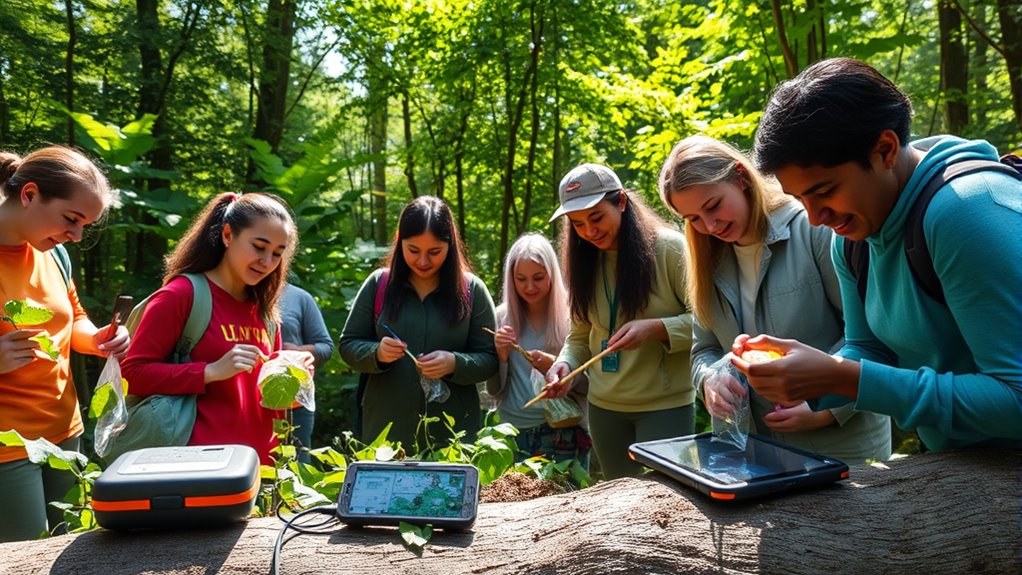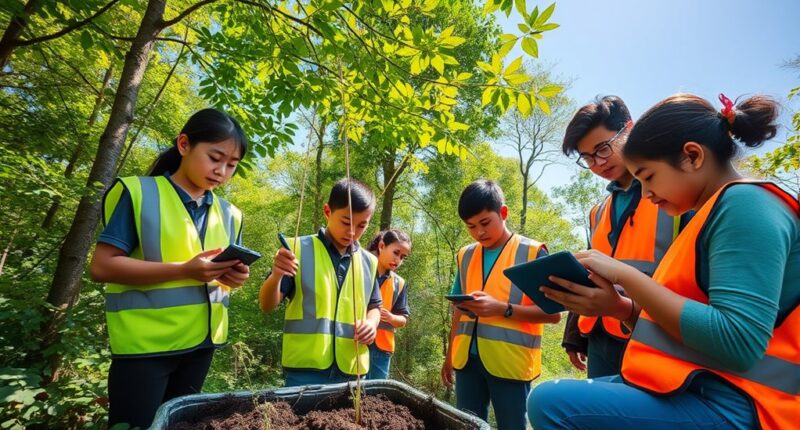You can join citizen science projects that help fight climate change by monitoring air and water quality, tracking wildlife, and collecting environmental data in your community. Organizations offer apps and tools to make participation easy and accessible, allowing you to report pollution sources, observe local species, and support conservation efforts. These activities empower you to make a difference and influence local policies. Keep exploring to discover how your actions can contribute to a healthier planet.
Key Takeaways
- Participate in urban pollution monitoring using apps and tools to track air and water quality locally.
- Contribute to wildlife conservation by recording sightings of birds, pollinators, and endangered species.
- Join community-based projects that collect environmental data to support climate change research and policy.
- Engage in local events or online platforms to collaborate with scientists and fellow volunteers for environmental initiatives.
- Collect accurate data to help develop strategies for reducing pollution and protecting ecosystems against climate impacts.

Have you ever wondered how everyday people can contribute to scientific discoveries? The truth is, you don’t need a lab coat or a PhD to make a real difference. Citizen science projects have opened doors for anyone eager to help tackle pressing issues like urban pollution and wildlife conservation. By participating, you become a vital part of a larger effort to understand and combat climate change. These projects often involve simple activities—like recording air quality, tracking local wildlife, or collecting data on environmental changes—making it easier than ever to get involved.
Anyone can help fight climate change through simple citizen science activities.
When it comes to urban pollution, citizen science projects empower you to monitor air and water quality in your own neighborhood. Many organizations provide tools and apps that allow you to record pollutant levels, report pollution hotspots, or track pollution sources. This data helps researchers identify patterns and develop strategies to reduce pollution. Your observations can influence local policies, encourage cleaner transportation options, or promote better waste management. By actively participating, you’re not just observing but also shaping the future of your city’s environment.
Wildlife conservation is another area where citizen scientists make a significant impact. Tracking local species helps scientists understand population trends, migration patterns, and the health of ecosystems. You might be asked to photograph birds, record sightings of endangered species, or monitor the habits of pollinators like bees and butterflies. These efforts contribute to larger databases that guide conservation strategies worldwide. Your involvement ensures that vital habitats are protected and that species at risk get the attention they deserve. Plus, it’s an engaging way to connect with nature and learn more about your local environment.
Joining citizen science projects also creates a sense of community and shared purpose. You’ll collaborate with fellow volunteers, scientists, and environmental organizations who are equally committed to fighting climate change. Many projects offer online platforms, local events, or training sessions to help you get started and stay involved. As more people participate, the collective data becomes more accurate and impactful, leading to better-informed decisions and policies. Your contribution, no matter how small it seems, adds up to a powerful force for positive change.
Additionally, understanding the importance of accurate data collection ensures your efforts truly benefit scientific research and policy making. In the end, citizen science isn’t just about gathering data; it’s about empowering you to be part of the solution. Whether you’re monitoring urban pollution or aiding wildlife conservation, your efforts help create healthier, more sustainable communities. Climate change is a challenging issue, but by engaging in these projects, you demonstrate that everyone has a role to play. Your observations, enthusiasm, and commitment can inspire others and bring about meaningful change—proof that even individual actions can contribute to a better future.
Frequently Asked Questions
How Much Time Do Citizen Science Projects Typically Require?
The project duration and volunteer commitment vary widely depending on the project. Some may only need a few hours for data collection, while others require ongoing involvement over weeks or months. You can choose projects that fit your schedule, from short-term contributions to long-term commitments. Most projects clearly outline the expected time investment, so you can easily find one that matches your availability and willingness to contribute to fighting climate change.
Are There Age Restrictions for Participating in These Projects?
When considering citizen science projects, you might wonder about age restrictions and volunteer eligibility. Many projects welcome a wide age range, but some have specific age restrictions to guarantee safety and appropriate participation. Always check the project’s guidelines, as they clearly outline volunteer eligibility. Whether you’re a student, adult, or senior, there’s often a suitable project for you, making it easy to contribute regardless of age.
What Skills or Equipment Are Needed to Get Involved?
Imagine your skills as a key opening opportunities. Usually, you don’t need extensive training requirements or fancy technical equipment to get involved. Most projects welcome beginners and provide guidance, making participation accessible. A keen eye, curiosity, and a willingness to learn are your most valuable tools. Sometimes, simple items like smartphones or basic tools are enough. Your enthusiasm and commitment are the real catalysts for making a difference.
Can Participation in Citizen Science Projects Influence Policy Change?
Participation in citizen science projects can markedly influence policy impact through your active community engagement. When you collect data and share findings, you help shape informed decisions by policymakers. Your involvement raises awareness and demonstrates public support for climate initiatives. As more people participate, your collective voice becomes a powerful tool for advocating change, proving that grassroots efforts can drive policy change and foster a more sustainable future.
How Is Data Quality Maintained in Citizen Science Initiatives?
Think of data quality in citizen science as a tightly woven tapestry—you want every thread to be strong. You uphold it through rigorous data validation processes and thorough volunteer training. By teaching volunteers how to collect accurate information and cross-checking data, you guarantee reliability. This way, the collective effort becomes a powerful tool, turning individual observations into trustworthy data that can truly inform scientific understanding and policy decisions.
Conclusion
By joining citizen science projects, you can directly contribute to fighting climate change. Did you know that over 2 million volunteers worldwide have collected data helping scientists monitor our planet’s health? Your efforts, whether tracking local air quality or observing wildlife, matter deeply. Every small action adds up, creating a powerful force for change. So, get involved today—your participation can make a real difference in protecting our future.










